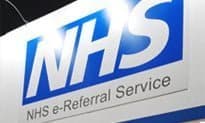E-Referral Service stabilised – then not
- 16 June 2015

The new NHS e-Referral Service was stabilised and running well on Tuesday afternoon; but it has subsequently suffered another day of problems.
Digital Health News reported on Monday that GPs and NHS trusts were unable to access the electronic referral service just hours after it was launched, due to “technical difficulties”.
NHS England’s director of strategic systems and technology, Beverley Bryant, said the system was taken down for 90 minutes around lunchtime on Tuesday, to put more capacity in the application servers.
It went back online just before 3pm and ran well for the rest of the afternoon, with 28,000 referrals completed on the system – less than a normal Tuesday, but more than half the regular number. However, the service, which has replaced the Choose and Book electronic booking system, has been offline again today.
"We’d like to encourage users to keep raising issues with us. We are listening and responding, we’re not relaxed. This isn’t to say it is sorted, but please keep using it and keep talking to us and telling us if you are not happy with it and it’s not right," Bryant said before the latest set of issues.
"I won’t be happy until I know we have a system that works for users. We promised an improvement on Choose and Book and at the moment I can’t say that I delivered that, but I’m determined I will."
The new e-Referral Service has been developed over the past two years by the Health and Social Care Information Centre and NHS England to replace Choose and Book, which was used to refer around 40,000 patients a day.
A report published by the HSCIC yesterday morning detailed 33 issues immediately following its launch, including problems accessing work lists and viewing referral histories.
Bryant explained that the worklist issue arose on Sunday when the transition process was started.
All the data was migrated successfully and the project team decided it was only a limited number of trust with huge work lists that would be affected by the system timing out after 20 seconds.
“We didn’t feel that warranted not going live because there was a work around,” she explained. “We rang around all the trusts we knew would be affected and it felt like a good decision."
However, as the system started to be used on Monday, it began to degrade for the rest of the users. This meant that only half the normal number of referrals were completed on the system.
Bryant said Tuesday started well, but at around midday the system started running slowly again because there wasn’t enough capacity in the application servers to deal with the volume of referrals.
There has not been a full investigation as to why this issue was not resolved before go-live, but she plans to do that “down the line”.
The team was advised to take the system down to sort the problem out, which was done over 90 minutes at lunchtime. Bryant added that there are business change teams spread out nationally with 12 leads who are liaising with trusts.
"We are responding, we are being honest and people are engaging with it,” she said. “People understand we have a much bigger strategic goal. I’m asking the service to bear with us.
"Of course it will be frustrating for people whose job it is to manage bookings in a trust. I can’t pretend that it won’t be frustrating, so we’ve just got to keep working at it and get it right."
Despite the initial teething problems, she is confident that plans to increase uptake of e-referrals with the new system will be achieved.
Update: this story was published on Tuesday evening, 16 June, but updated Wednesday, 17 June, following the further problems. Digital Health News will be publishing a further story on the progress of the e-Referral Service tomorrow, Thursday 18 June.




